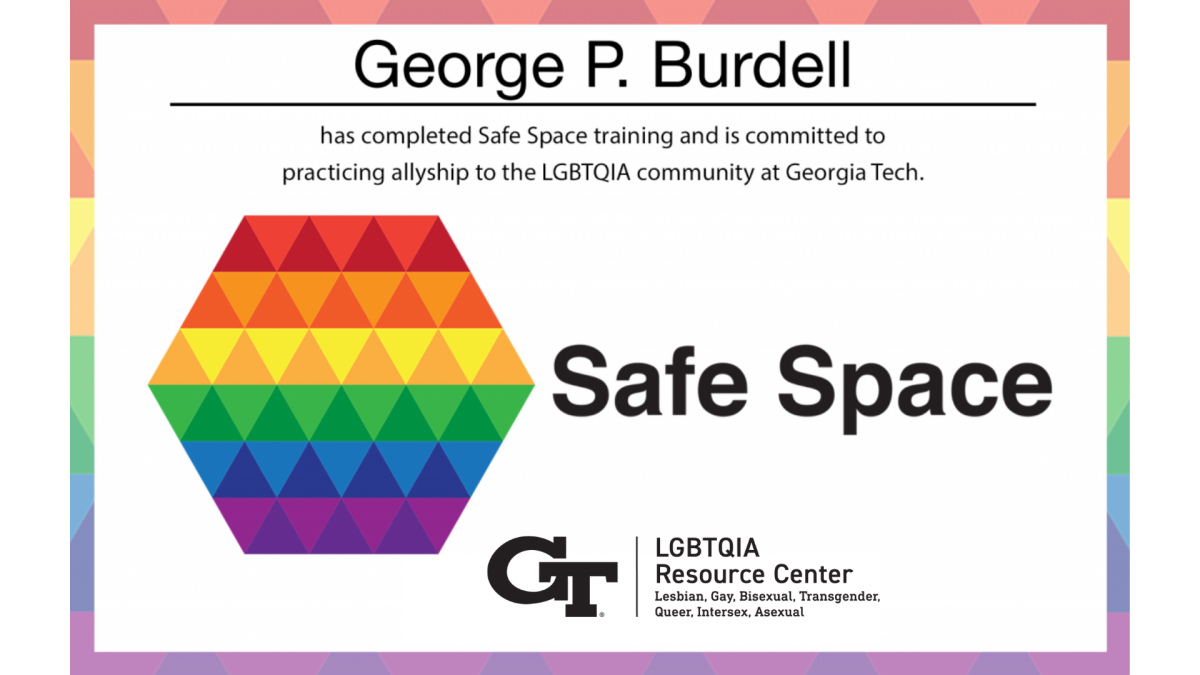Spring 2024 Dates
January
Thursday, January 18 | 1 - 3 p.m.
February
Thursday, February 15 | 1 - 3 p.m.
March
Tuesday, March 12 | 1 - 3 p.m.
Please read before registering!
Who can attend a Safe Space training?
Training sessions are open to all employees, students, postdocs, and GT affiliates who have a sincere interest in learning more about how to practice allyship to the LGBTQIA community.
What will I learn in Safe Space?
Each training lasts 2 hours. By the end of the Safe Space training, participants will:
- Understand the importance of building knowledge and skills to contribute to safer, more welcoming, and inclusive environments.
- Be able to articulate the differences between sex, gender, gender expression, and sexual orientation and define key LGBTQ+ terminology.
- Be able to describe the implications of normative assumptions and gain an understanding of the coming out process for LGBTQ+ individuals.
- Be able to define privilege and bias in the context of gender and sexual identities.
- Be able to explain some LGBTQ+ experiences in society and recognize what the climate is like for LGBTQ+ individuals at Tech Identify strategies to contribute to inclusive environments for LGBTQ+ individuals.
Please note: This training will include some discussion of sensitive topics, including anti-LGBTQIA bias and mental health concerns, including some brief mentions of suicide and self-harm. Please use your judgment and your knowledge of your own boundaries and self-care needs when deciding whether to register.
What will I get if I complete the training?
Participants who complete Safe Space Foundations training will receive a card to display in their work space to indicate to others that they have completed the program and can provide support to LGBTQIA peers and students.
I want my office, department, or student organization to be Safe Space trained. How can I set up a training for them?
Great question. First of all, we ask that you don't make Safe Space Foundations training mandatory for your colleagues or members. If you'd like to request a training for your department separate from the scheduled trainings, we ask that you have a minimum of 15 people commit to attending a training before you reach out to us. If you have fewer than 15 people who are interested, please consider registering for one of our monthly open sessions. If there is sufficient interest in your department or group for a Safe Space Foundations training, please contact William Britto, to discuss your options.
Accessibility Information
Event Space
All in-person trainings will take place in the John Lewis Student Center & Stamps Commons Building. If you drive, there are parking options available near the building. The training rooms are wheelchair-accessible, but please indicate on your registration if you use a wheelchair or other mobility aid so that we can arrange the room accordingly. The building is wheelchair accessible and has elevators on each floor. For most of the training, participants will be seated at tables in chairs that have no arms. There are also single user gender-inclusive restrooms on each floor. If you have more questions about accessibility needs, please contact William Britto
Activities/Movement
The activities in Safe Space Foundations do have some movement but can be modified.
Training Materials
The training is delivered using PowerPoint slides with minimal text. Some handouts are printed in 14pt font and others in 12pt. Please notify us if you require large-print electronic handouts or a digital copy of the slide deck in advance.
